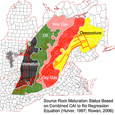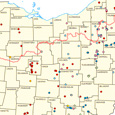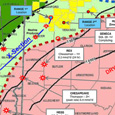Marcellus Shale boom adds less jobs than originally forecasted
Wednesday, June 22, 2011
HARRISBURG, Pa. — Between late 2007 and 2010, the Marcellus Shale boom created fewer than 10,000 new jobs in Pennsylvania, much less than the 48,000 figure reported in recent news stories, statements and commentaries.
In a new policy brief, the Keystone Research Center explains that those recent reports with exaggerated claims about Marcellus job creation rely on data about “new hires,” which are not the same as new jobs.
New jobs
“New hires” track additions to employment but not separations due to resignations, firings or replacements. Between the fourth quarter of 2009 and the first quarter of 2011, Marcellus industries added 48,000 “new hires,” while all Pennsylvania industries added 2.8 million “new hires.”
As Pennsylvanians well know, the commonwealth has added nothing like 2.8 million jobs to the economy since 2009 — in fact, only 85,400 new jobs were created.
“The number of new hires by itself tells half the story and is not a meaningful indicator of job creation,” said Stephen Herzenberg, PhD, Executive Director of the Keystone Research Center. “You have to also look at the number of people who leave jobs.”
View the policy brief, “Drilling Deeper into Jobs Claims: The Actual Contribution of Marcellus Shale to Pennsylvania Job Growth,” online at www.keystoneresearch.org.
Reports
Between the fourth quarter of 2007 and the fourth quarter of 2010, according to the latest report from the Pennsylvania Department of Labor and Industry’s Center for Workforce Information and Analysis (CWIA), all Marcellus Shale-related industries added 5,669 jobs.
Six industries in what CWIA defines as the “Marcellus Core” industries added 9,288 jobs during this period. Over the same three years, 30 industries in a group CWIA calls “Marcellus Ancillary” actually lost 3,619 jobs.
Overall, Marcellus job growth is small — accounting for less than one in 10 of the 111,400 new jobs created since February 2010, when employment bottomed out after the recession, the report finds.
Even if Marcellus Shale-related industries had created no jobs in 2010, the state still would have ranked third in overall job growth among the 50 states.
“The Marcellus boom has contributed to job growth, but the size of that contribution has been significantly overstated,” Dr. Herzenberg said. “To explain Pennsylvania’s relatively strong recent job growth requires looking at factors other than Marcellus Shale — such as the state’s investments in education, renewable energy, workforce skills, and unemployment benefits,” he added.
Balance
The report also states that any economic benefit from the Marcellus Shale must be balanced against the impact of drilling on other industries, such as tourism and the Pennsylvania hardwoods industry.
To sustain Pennsylvania’s strong economic performance, policymakers should adopt a drilling tax or fee that helps finance job-creating investments in education and the economy, as well as providing resources to protect the environment and address infrastructure needs, the report recommends.
Policy
Pennsylvania should also develop a Marcellus Shale economic development policy that includes training and placement of more Pennsylvania workers in high-paying Marcellus jobs; investing in industries that supply equipment, parts and services to the industry; enabling Pennsylvania manufacturers to benefit from low-cost natural gas; and setting aside revenue to seed a fund that will develop post-Marcellus Shale industries.
The Keystone Research Center is a nonprofit, nonpartisan research organization that promotes a more prosperous and equitable Pennsylvania economy. Learn more: www.keystoneresearch.org.




